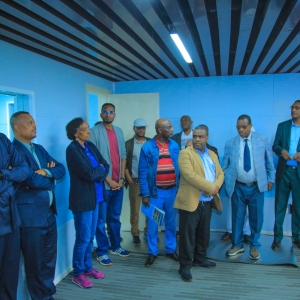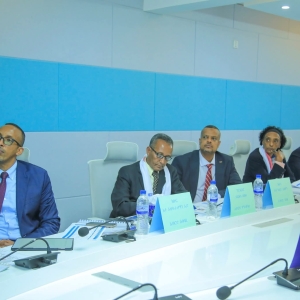 From August 26 to 28, 2017 (01-03/09/2025), the Administrative Board Wollega University convened at the main Campus in Nekemte for its regular meeting. During the session, the Board reviewed and approved the University’s 2017 (2025) annual performance report and the 2018 (2025/6) strategic and operational plan. In addition to approving these key documents, the Board provided recommendations, directives, and strategic guidance on a range of critical issues.
From August 26 to 28, 2017 (01-03/09/2025), the Administrative Board Wollega University convened at the main Campus in Nekemte for its regular meeting. During the session, the Board reviewed and approved the University’s 2017 (2025) annual performance report and the 2018 (2025/6) strategic and operational plan. In addition to approving these key documents, the Board provided recommendations, directives, and strategic guidance on a range of critical issues.
The meeting was chaired by the Honorable Mr. Abdurahman Eid, State Minister for Revenue and Chairperson of the Wollega University Administrative Board. Accompanied by fellow board members, he also conducted an extensive field visit across the university’s main campus to observe ongoing developments and initiatives. In his opening remarks, Hon. Mr. Abdurahman emphasized the vital role of the Board in institutional leadership, strategic oversight, and governance—particularly in the areas of policy, finance, and long-term planning. He reaffirmed the Board’s commitment to ensuring that the University remains aligned with national educational goals and global academic standards.
Dr. Tesfaye Lemma, President of Wollega University, expressed his sincere appreciation to the Board members for their active participation and for taking the time to engage with the University community in person. He noted that their presence played a significant role in facilitating a comprehensive review of the University’s current status and future direction.
During the three-day session, the Board thoroughly evaluated the 2017 (2025) performance report and the proposed 2018 (2025/5) budget and work plan. These documents covered key focus areas such as teaching and learning, research and community engagement, administration, and institutional development. The Board approved the plans with additional insights and feedback to enhance implementation. Particular emphasis was placed on the identification and prioritization of Key Performance Indicators (KPIs)—both strategic and operational. The Board instructed that these indicators be clearly defined and cascaded from the senior leadership down to academic and administrative units. Performance will be assessed based on tangible outcomes, measurable impacts, and the contributions made toward fulfilling the University’s broader mission.
 One of the key directives was for the University to develop a forward-looking strategic plan aimed at building institutional autonomy. The Board stressed that this requires the effective mobilization of internal resources, leveraging the University's highly educated workforce, and undertaking transformative research and community development initiatives. Recognizing budgetary constraints, the Board recommended the pursuit of competitive projects and international partnerships to secure additional funding and diversify income streams.
One of the key directives was for the University to develop a forward-looking strategic plan aimed at building institutional autonomy. The Board stressed that this requires the effective mobilization of internal resources, leveraging the University's highly educated workforce, and undertaking transformative research and community development initiatives. Recognizing budgetary constraints, the Board recommended the pursuit of competitive projects and international partnerships to secure additional funding and diversify income streams.
As part of their visit, the Board members toured the Institute of Health Sciences Comprehensive Specialized Hospital, reviewing its efforts to integrate academic and clinical functions. They also evaluated ongoing infrastructure and construction projects across the campus.
A notable agenda item was the University Senate’s proposal to elevate the College of Engineering and Technology to the status of Institute of Technology (IoT). The Board endorsed this initiative in principle and directed that a comprehensive strategic plan be developed—not merely as a structural change, but as a blueprint for deeper linkages with industry, centers of excellence, and resource mobilization.
In addition, the Board discussed other strategic issues requiring their input and oversight. They provided direction on resolving persistent internal challenges, calling for decisive and transparent leadership. The guidance aligns with Ethiopia’s higher education reform agenda and the University’s national development responsibilities. Before concluding the session, the Board issued specific work assignments to its members, outlining follow-up actions and emphasizing close monitoring of institutional progress. The meeting concluded with site visits to key university facilities, including the Service and Production Enterprise (engineering workshops), MMS, VDI Library, and various areas. A symbolic tree planting ceremony was also conducted to underscore the University’s commitment to environmental sustainability.
In closing, the Administrative Board expressed gratitude to the local administration, security forces, and the broader community for their ongoing support in maintaining a peaceful and productive academic environment across all three campuses of Wollega University. The Board urged continued collaboration to advance the University’s mission and goals.
